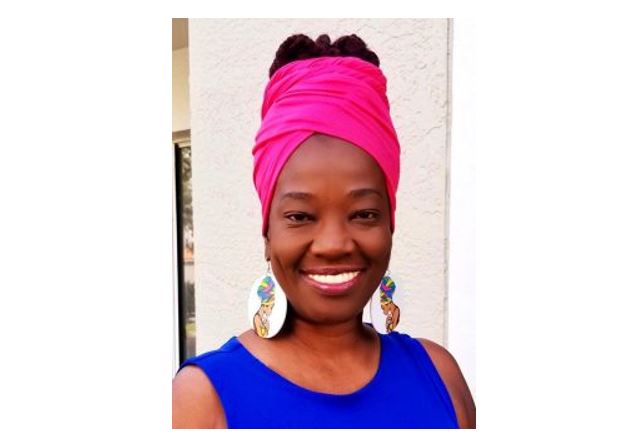PUBLISHED: 24th August 2020

By Romane Petit Joseph
When I moved to the U.S. with my daughter 14 years ago, I was in good shape, healthy and optimistic about the future. I had no experience of severe illness. On February 1, 2013, following my biannual checkups, my doctor informed me that I had ductal carcinoma in situ (DCIS) with estrogen positive- and progesterone positive-receptors in my right breast. How could this happen to me? I was in my prime: I followed a diligent diet, exercised and stayed up-to-date with my checkups. I worked hard to take care of my family while earning my master’s degree. I was at a loss for words, distraught and unable to comprehend the details and recommendations that my doctor provided. The day of my cancer diagnosis turned out to be my worst nightmare.
From hopeless to hopeful
My daughter, Tesha, was only 15 years old. I will never forget the look of total disbelief in her eyes when I told her about my diagnosis. We wept as we told my best friend, my husband and the rest of my immediate family, who lived in Haiti at the time. In Haitian culture, a cancer diagnosis is perceived as a death sentence. However, I had to be resilient and remain positive to minimize the emotional toll on my family and to share the available options and path to survivorship. That night, when all the lights went off, I prayed and believed that I had the opportunity to win this battle. I immediately started to shift my outlook from feeling upset and hopeless to believing that anything was possible. I was very determined to fight.
Genetic testing and the decision to fight
Per my surgeon’s recommendation, I consulted a genetic counselor, who was not convinced that my cancer was a result of a gene mutation, due to my family tree. Then a month later, we received the test results. My counselor appeared concerned, but showed compassion when telling me that I carry the BRCA2 genetic mutation, which can lead to breast, ovarian, pancreatic and skin cancers. I cried hysterically, because I believed that I was going to die. She consoled me and assured me that I could change the trajectory of my diagnosis if I was willing to make tough choices, including a bilateral mastectomy and total hysterectomy. I was distressed. I was not ready to permanently separate myself from my breasts, which have been a part of me all my life. I was heavily concerned about my appearance and frightened with the prospect of losing my sense of femininity.
Gene mutation and family members
As the first person to be diagnosed with hereditary breast cancer in my family, I am convinced I was meant to save lives among my relatives. Six months following my diagnosis, my mother was also diagnosed with hereditary breast cancer. She underwent surgeries, chemotherapy and radiation. Through her experience, I saw the ugliest face of cancer. My daughter is now 22, and I am so grateful that her goal is to become a previvor. I urged my sisters to be tested; one of them tested positive for BRCA2 four years ago, but has yet to take preventive actions. Six years after my victory, I am still spreading the word among my extended family about the potential risks, the importance of getting tested and being proactive. So far, the most common reactions are mostly silence, inaction and denial. It’s like whistling in the wind. Nonetheless, I won’t stop because I know that early detection saved my life. We have seen the lives of so many brothers and sisters cut short, because for them, it was too late to act. It is indisputable that preventing a disease is better than striving to cure it.
A compassionate community
When I was facing my fears, I had a lot of support from various organizations, including FORCE, that support women who are touched by breast cancer. I was welcomed by my sisters, Debbie and Annie, who provided me with the resources, love and support I needed to fight and survive cancer. As a black woman who is affected by hereditary breast cancer and who faces a constant threat of recurrence, I am grateful to be a member of FORCE. In 2015, I had the privilege of attending the annual Joining Forces Conference in Philadelphia, sponsored and hosted by FORCE. It was a life-changing experience. I gained so much knowledge from experts and learned about the importance of clinical research, which urged me to participate in my first clinical trial with the Basser Research Center for BRCA. Following the conference, I also participated in focus group discussions with other organizations aimed at preventing breast cancer recurrence through healthy lifestyle and behaviors. At the conference, I was so inspired by the courageous women I met who shared similar experiences as myself. They certainly uplifted and helped me accept and love my new body. I was also moved to help make a difference in my community by supporting other women who go through their dark days with breast cancer. I am now a volunteer with FORCE’s South Florida Chapter.
Words of hope
People who are newly diagnosed with cancer feel lost and overwhelmed like I did six years ago. It is okay to cry, feel angry or afraid, lose faith and feel shattered and helpless. But you can’t give up. You should fight until the end. With a positive mindset and support, you will have the strength to fight. Things will get better. You are not alone in this marathon and, together, we will get to the finish line.
Romane Petit Joseph, BRCA2 Breast Cancer Survivor
POSTED IN: Health Equity And Disparities , Stories , Diversity And Inclusion
TAGS: Breast Cancer , DCIS , Health Disparities , Health Equity , Haitian , Black Women